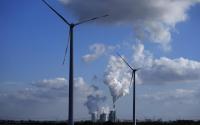Common Dreams / Published on Thursday, August 31, 2006 by the Inter Press ServiceEmad Mekay
Top oil and defence industry executives in the United States are raking in record personal profits on the backs of the U.S. wars following the terror attacks of Sep. 11, 2001 and sky-high oil prices, two think-tanks said Wednesday."CEOs (chief executive officers) in the defense and oil industries have been able to translate war and rising oil prices into personal jackpots," says the new report "Executive Excess 2006," a 60-page study by the Institute for Policy Studies in Washington and the Boston-based United for a Fair Economy. The report's authors say U.S. taxpayers are funding much of this bonanza and faulted U.S. political and congressional leaders for not exercising better and more thorough oversight. "Americans across the political spectrum should be outraged by the sight of executives cashing in on war windfalls," says report co-author Sarah Anderson. "Unfortunately, partisan politics has stopped Congress from effectively overseeing this war contracting free-for-all." The study surveys all publicly held U.S. corporations among the top 100 defence contractors that had at least 10 percent of revenues in defence. It found that the top 34 CEOs combined have earned almost a billion dollars since the 9/11 attacks on the United States. This would have been enough money to employ and support more than a million Iraqis for a year to rebuild their country. The defence executives' average compensation jumped from 3.6 million during the pre-9/11 period of 1998-2001 to 7.2 million dollars during the post-9/11 period of 2002-2005. Among other startling facts revealed in the report is that in 2005 alone, defence industry CEOs garnered 44 times more pay than military generals with 20 years experience, and 308 times more than Army privates. The report names United Technologies CEO George David as the winner of the top spot in executive profits after the Iraq war with more than 200 million dollars in pay since 9/11, despite investigations into the quality of the company's Black Hawk helicopters. Health Net's CEO Jay Gellert secured the biggest personal pay raise after 9/11, a gigantic 1,134 percent leap over the preceding four years. "The company owes its earnings growth to American taxpayers, who may not realize they pick up a hefty share of cost overruns in the privatized military health care system," said the report. Halliburton CEO David Lesar made a modest 26.6 million dollars last year, even though his company has been criticised for its links to U.S. Vice President Dick Cheney. "While Halliburton's future Iraq work is uncertain, Lesar will enjoy the nearly 50 million dollars he has made since the 'War on Terror' began," the report says. Oil company chief executives are also making three times the pay of CEOs in comparably sized businesses. In 2005, the top 15 U.S. oil industry CEOs got a 50 percent raise over 2004. They now average 32.7 million dollars, compared with11.6 million dollars for all CEOs of large U.S. firms, the report finds. The top three highest-paid U.S. oil chiefs in 2005 were William Greehey of Valero Energy at 95.2 million dollars, followed by Ray R. Irani of Occidental Petroleum at 84 million dollars and Lee Raymond, the outgoing CEO of ExxonMobil, at 69.7 million dollars. The lowest paid was Chad Deaton, CEO of Baker Hughes, at 6.6 million dollars. "The average construction worker at an energy company would have to work 4,279 years to equal what Greehey collected last year," the report noted. Executive pay at U.S.-based oil companies also far outpaced pay at oil companies based outside the United States, says the report. International oil giants BP and Royal Dutch Shell, the second and the third largest internationally, paid their top executives only one-eighth what their U.S. counterparts received -- 5.6 and 4.1 million dollars in 2005, respectively. Both companies operate in the same global marketplace as their U.S.-based competitors. Since 1990, the overall CEO-worker pay gap in the United States has grown from 107-to-1 to last year's 411-to-1, said the report The study came out a day after another U.S think-tank, the Phoenix Centre for Advanced Legal and Economic Public Policy Studies, issued a report defending oil industry profits by comparing the overall profitability of the U.S. oil firms to other industries. It concluded that "selling beer or bleach is more profitable than selling gas and oil, even during times of 'record' profits for the oil companies." The Phoenix Centre, which looks into broad public-policy issues and promotes a free-market approach, studied profits from companies like ExxonMobil, Chevron-Texaco, ConocoPhillips, Shell, Marathon, Hess and Sunoco. "It may be fashionable to beat up on oil industry profits, but it appears that these firms do bear at least some of the burden of high oil prices," said George S. Ford, Phoenix Centre's chief economist and author of the study. "Our analysis shows that when gas prices are at their highest, oil industry profitability is at its lowest," he said. But the Phoenix Centre's position may be a lonely one in light of reports that BP, which operates some of the largest oil field in the United States, is under investigation by the Justice Department and the U.S. Commodity Futures Trading Commission for possible manipulation of crude oil and gasoline markets.






